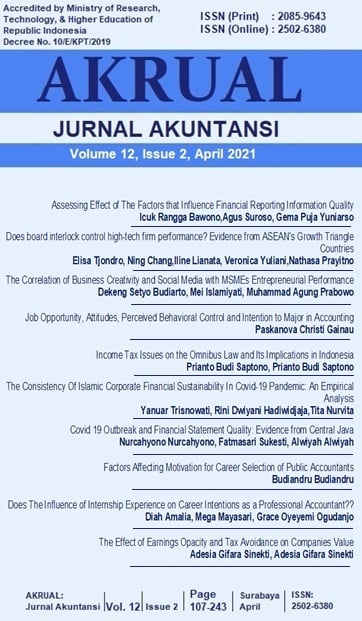Job Opportunity, Attitudes, Perceived Behavioral Control and Intention to Major in Accounting
DOI:
https://doi.org/10.26740/jaj.v12n2.p143-163Keywords:
theory of planned behavior, job opportunities, reputation of higher education institution on accounting, partial least square, accounting college studentAbstract
This research aims to capture the accounting behavior phenomenon in accounting students at private universities in Manado. This research is developed from the study of Lin & Fawzi (2006), Zandi et al.(2013), and Odia & Ogiedu (2013). To find out the inconsistency of these researches, this research focus to study about the studentss intention in choosing an accounting program. Partial least square is used to analyze the research model. This study used questionnaires and deep interviewed to collect the data. It reveals that job opportunities deliver positive effects on accounting studentss attitudes, and these attitudes affect their intention to select the program. The reputation on higher education institutions on accounting do not determine the studentss attitudes to enroll in accounting. Subjective norm do not influence students intention. Perceived behavior control positively encourages the purposeof choosing the accounting program. These findings designate implications for accounting lecturers to explain the benefits, job opportunities, and temporary accounting issues to students. Management of the accounting department needs to re-design their curriculum; thus, it can drive college students to compete and have fun throughout the learning process. Lecturers are obligated to update their learning methods and include educational characters in the provision of material to increase students's motivation.References
Bobek, D.D., and R. C. Hatfield. 2003. An Investigation of The Theory of Planned Behavior and The Role of Moral Obligation in Tax Compliance. Behavioral Research In Accounting, Volume 15, 2003.
Cohen, J. 1988. Statistical Power Analysis for the Behavioral Sciences. Hillsdale. New Jersey: Lawrence Erlbaum Associates.
Gul, F. A. et al. 1989. Factors Influencing Choice Of Discipline Of Study -Accountancy, Engineering, Law and Medicine, Accounting and Finance, 29, pp. 93-101.
Latan, H.and I. Ghozali, 2012.Konsep, Teknik dan Aplikasi SmartPLS 2.0 M3 untuk Penelitian Empiris.Semarang: Badan Penerbit Universitas Diponegoro.
Tenenhaus, M., Amato, S., and Esposito Vinzi, V. 2004. A Global Goodness of Fit Index for PLS Structural Equation Modeling. Proceedings of the XLII SIS Scientic Meeting, Vol. Contributed Papers, CLEUP, Padova, pp. 739-742.
Widowati, A. I., & Surjawati, S. (2015). Studi Tentang Keputusan Memilih Jurusan S1 Akuntansi (Studi Empiris Pada Mahasiswa Program Studi S1 Akuntansi Universitas Semarang). Jurnal Dinamika Sosial Budaya, 17(1), 1. https://doi.org/10.26623/jdsb.v17i1.498
Downloads
Published
How to Cite
Issue
Section
License
Copyright (c) 2021 AKRUAL: Jurnal Akuntansi

This work is licensed under a Creative Commons Attribution-NonCommercial 4.0 International License.
 Abstract views: 1835
,
Abstract views: 1835
, PDF Downloads: 1251
PDF Downloads: 1251


















